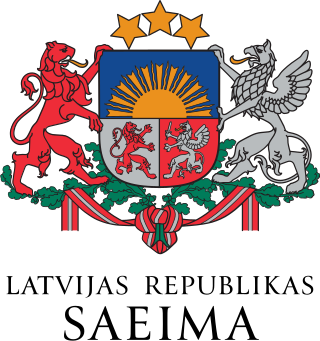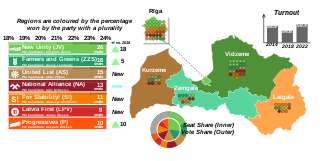
Sergejs Fjodorovs (born 1956) is a Latvian politician. He is a member of the Socialist Party of Latvia and was a deputy of the 8th, 9th and 10th Saeima (Latvian Parliament). [1]

Sergejs Fjodorovs (born 1956) is a Latvian politician. He is a member of the Socialist Party of Latvia and was a deputy of the 8th, 9th and 10th Saeima (Latvian Parliament). [1]

The Saeima is the parliament of the Republic of Latvia. It is a unicameral parliament consisting of 100 members who are elected by proportional representation, with seats allocated to political parties which gain at least 5% of the popular vote. Elections are scheduled to be held once every four years, normally on the first Saturday of October. The most recent elections were held in October 2022.

The Constitution of Latvia, ratified on February 15, 1922, contains a provision regarding one of the reserve powers of the President of Latvia to initiate the dissolution of the parliament. According to Article 48-50 of the Constitution,
Latvia has recognised civil unions since 1 July 2024. On 9 November 2023, the Saeima passed legislation establishing same-sex civil unions conferring similar rights and obligations as marriage with the exception of adoption and inheritance rights. The bill was signed into law by President Edgars Rinkēvičs in January 2024, and took effect on 1 July 2024. This followed a ruling from the Constitutional Court of Latvia on 12 November 2020 that the Latvian Constitution entitles same-sex couples to receive the same benefits and protections afforded by Latvian law to married opposite-sex couples, and gave the Saeima until 1 June 2022 to enact a law protecting same-sex couples. In December 2021, the Supreme Court ruled that should the Saeima fail to pass civil union legislation before the 1 June 2022 deadline, same-sex couples may apply to a court to have their relationship recognized. The Saeima failed to meet this deadline, and the first same-sex union was recognized by the Administrative District Court on 30 May 2022.

The Constitution of Latvia is the fundamental law of the Republic of Latvia. Satversme is the oldest Eastern or Central European constitution still in force and the sixth oldest still-functioning republican basic law in the world. It was adopted, as it states itself in the text, by the people of Latvia, as represented in the Constitutional Assembly of Latvia, on 15 February 1922 and came into force on 7 November 1922. It was heavily influenced by Germany's Weimar Constitution and the Swiss Federal Constitution. The constitution establishes the main bodies of government ; it consists of 116 articles arranged in eight chapters.
Vadims Fjodorovs is a Latvian former football goalkeeper, currently a goalkeeping coach for Daugava Daugavpils in the Latvian Higher League.

The Declaration "On the Restoration of Independence of the Republic of Latvia" was adopted on 4 May 1990 by the Supreme Soviet of the Latvian SSR in which Latvia declared independence from the Soviet Union. The Declaration stated that, although Latvia had de facto lost its independence in 1940, when it was annexed by the Soviet Union, the country had de jure remained a sovereign country as the annexation had been unconstitutional and against the will of the Latvian people.

The president of Latvia is head of state and commander-in-chief of the National Armed Forces of the Republic of Latvia.

Sergejs Dolgopolovs is a Latvian politician. He is a member of Harmony, former deputy mayor of Riga (2001–2005) and a deputy of the 9th, 10th, 11th, 12th and 13th Saeima (2006-present). In 2015 he was the Harmony's candidate in the election for President of Latvia.

Sergejs Mirskis , is a Latvian politician. He is a member of Harmony and a deputy of the 10th, 11th and 12th Saeima. He began his current term in parliament on November 18, 2010. He is of partial German descent.
The current administrative division of Latvia came into force on 1 July 2021.

Parliamentary elections were held in Latvia on 6 October 2018. Following the elections, a coalition government was formed by Who owns the state?, the New Conservative Party, Development/For!, the National Alliance and New Unity. Despite being from the smallest elected party, Arturs Krišjānis Kariņš of New Unity was chosen as prime minister.

The Speaker of the Saeima is the presiding officer of the Parliament of Latvia, the Saeima.

Sergejs Potapkins is a researcher of Latvian Institute of International Affairs. Former member and deputy chairman of the Foreign Affairs Committee of the Latvian Parliament (Saeima). He was also Chairman of the Latvia-Armenia and Latvia-China interparliamentary cooperation group. Alumni of Munich Young Leaders Network 2015, and Associate Contributor of Agora Strategy Group AG. Sergejs Potapkins has obtained a Master's degree from the Faculty of European Studies, Riga Stradins University. Research interests of Sergejs Potapkins include the Global South, China and India, security issues, as well as the South Caucasus region and Armenia in particular. In 2016, Potapkins was awarded the Memorial Award of the National Assembly.

Indirect presidential elections were held in Latvia on 3 June 2015. Raimonds Vējonis of the Green Party was elected President and took office on 8 July. According to the European Green Party, he is the first of their members to become a head of state of a European Union member state.
Sergejs is a masculine Latvian given name. Notable people with the name include:
Vladislavs Fjodorovs is a Latvian professional footballer who plays as a left winger.

The New Conservative Party, known as The Conservatives from February 2022 to October 2023, is a liberal-conservative political party in Latvia.

Parliamentary elections were held in Latvia on 1 October 2022, following the end of the term of the 13th Saeima elected in 2018.

Latgallia is one of the five multi-member constituencies of the Saeima, the national legislature of Latvia. The constituency was established in 1922 when the Saeima was established following Latvia's independence from the Soviet Union. It consists of the cities of Daugavpils and Rēzekne and municipalities of Augšdaugava, Balvi, Krāslava, Līvāni, Ludza, Preiļi and Rēzekne in the region of Latgallia. The constituency currently elects 13 of the 100 members of the Saeima using the open party-list proportional representation electoral system. At the 2022 parliamentary election it had 194,825 registered electors.

Riga is one of the five multi-member constituencies of the Saeima, the national legislature of Latvia. The constituency was established in 1922 when the Saeima was established following Latvia's independence from the Soviet Union. It consists of the city of Riga and overseas voters. The constituency currently elects 36 of the 100 members of the Saeima using the open party-list proportional representation electoral system. At the 2022 parliamentary election it had 565,297 registered electors.